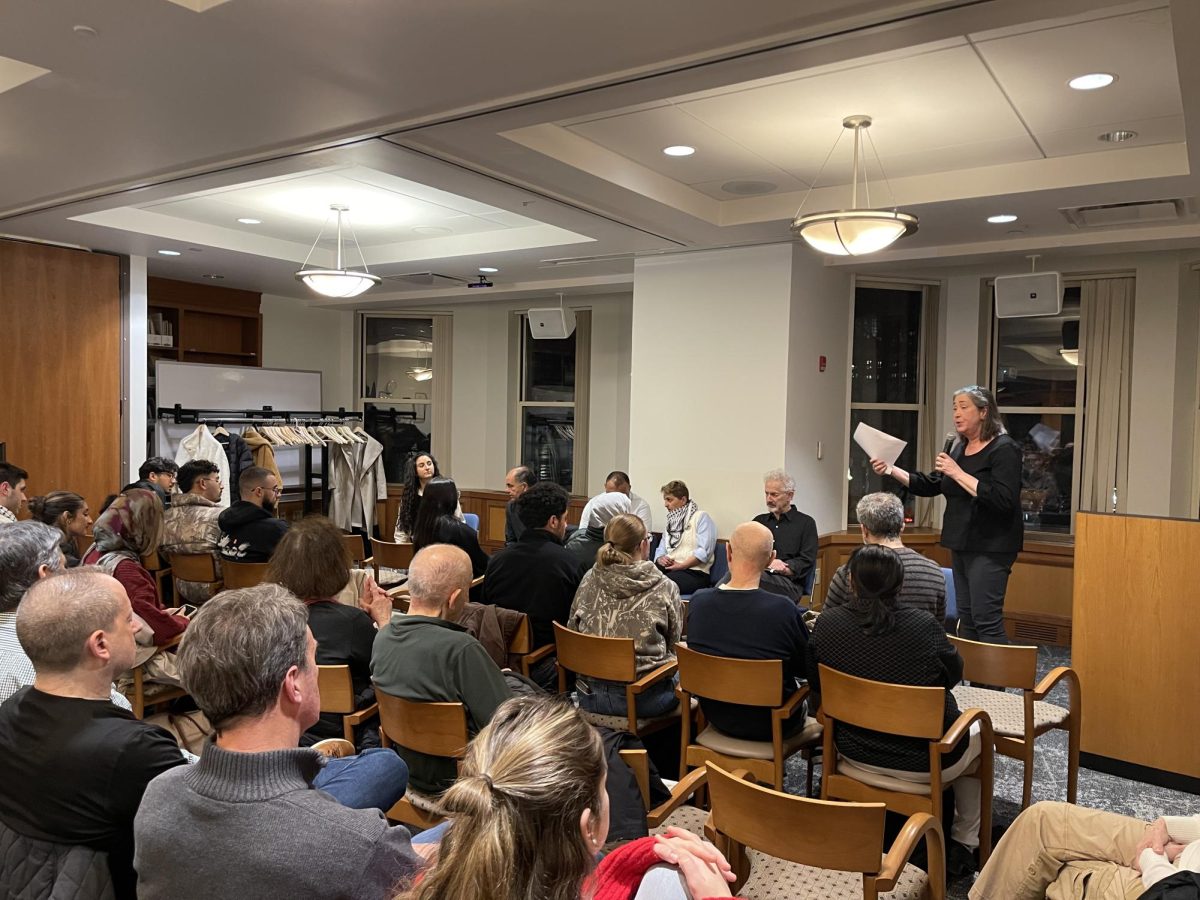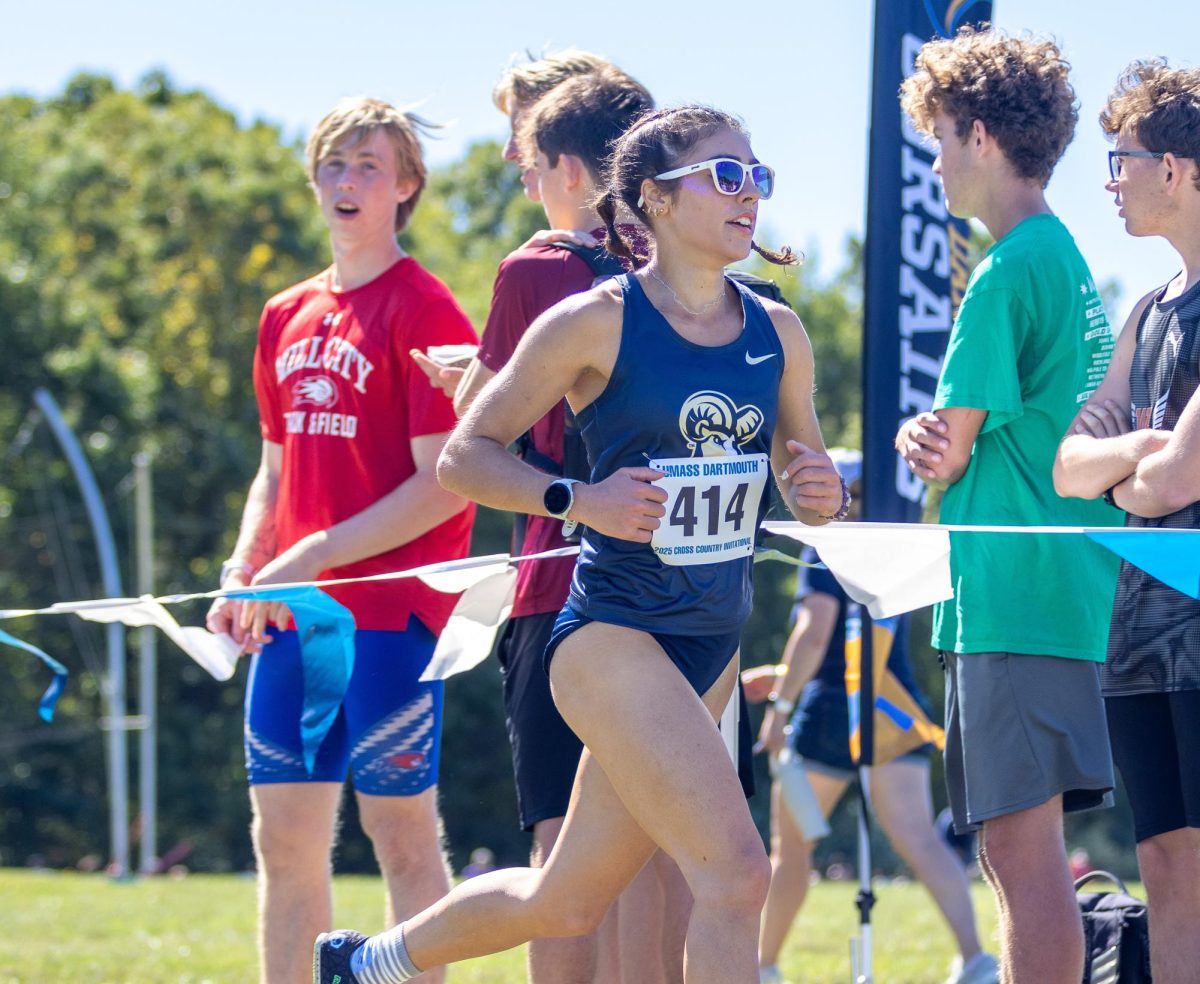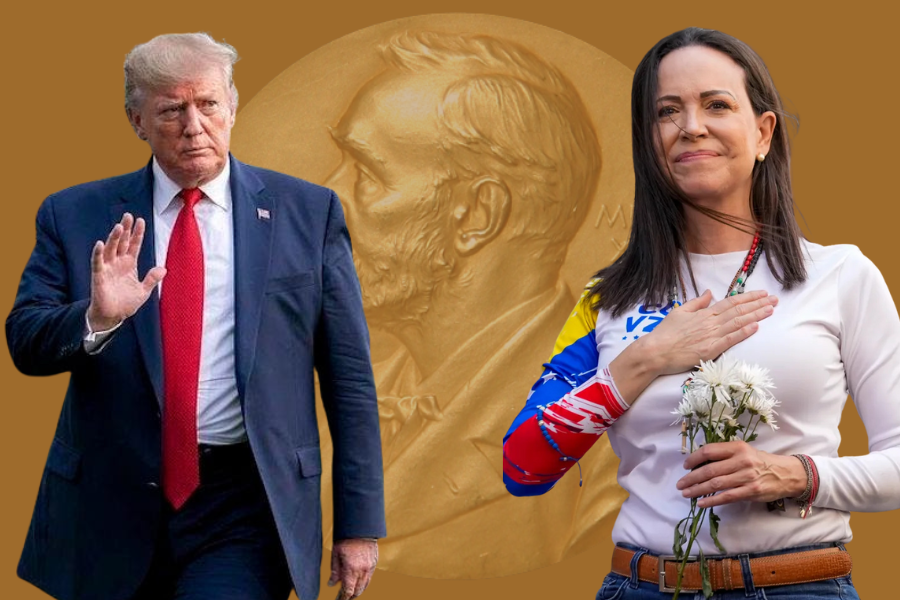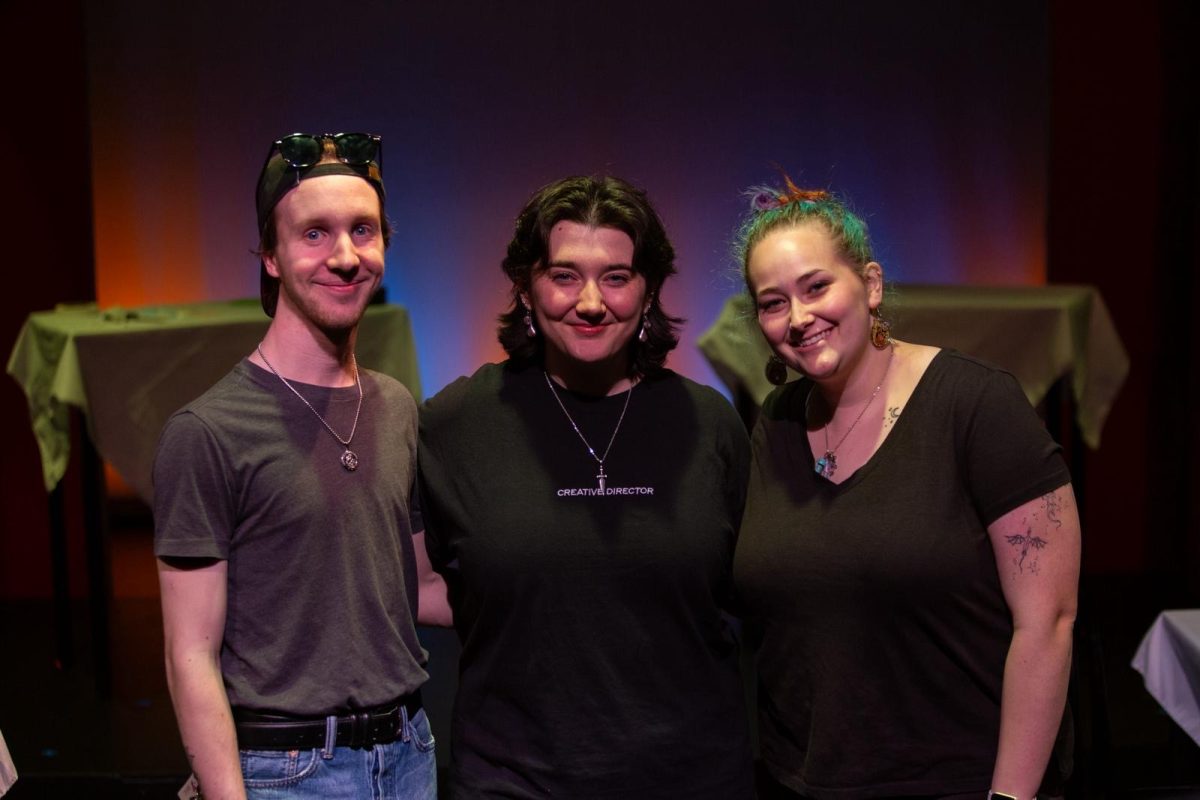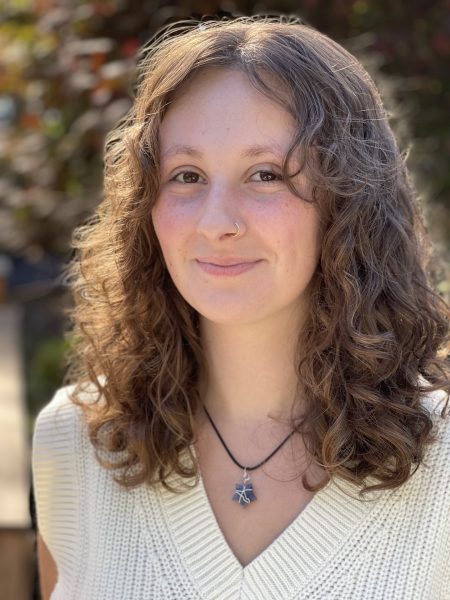“I was on the list of people that Israel wanted to kill, I was in jail 20 times, I was the youngest prisoner in the jail. I am very lucky that I am among us all today. Because if I had continued with my violent resistance, I wouldn’t be sitting here,” said Jamil Qassas.
Qassas is a part of Combatants for Peace, a “grassroots movement of Israelis and Palestinians, working together to end the occupation and bring peace, equality and freedom to our homeland,” according to its website.
The 2025 documentary, “There is Another Way,” directed and produced by Stephen Apkon, shows the stories and experiences of members of Combatants for Peace during the Oct. 7 attacks and the war in Gaza and West Bank that followed.
This film was screened at Suffolk University April 2, followed by a panel with three members of Combatants for Peace that were featured in the documentary, including Qassas, Elie Avidor and Mai Shahin, as well as the director, Apkon. Qassas spoke in Arabic and during the event, Shahin translated.
“There is Another Way” features interviews with members of Combatants for Peace and footage from the ongoing war.
Born in the Dheisheh refugee camp, Qassas’ family had been displaced due to war and their land was never theirs again. For much of his life, Qassas said that he hated Jewish people because the only ways he had seen them was as military, Israeil Defense Force soldiers and settlers.
“Seeing them only in these three positions creates anger and it brings violence,” said Qassas.
This was until he had to work in Israel after the intifada. When he realized his boss was an Israeli Jew, he thought he would be fired.
“When he heard that my brother was murdered and that I was in jail and my story, he wanted to hear more. And when he first called me, I thought, okay, he will listen to me for two minutes and kick me out, he will say, you cannot work here. But when I went to his office and I shared my story with him, I saw that he had tears, he was crying. And he shook my hand and he said ‘you will continue working with us.’ This shocked me,” said Qassas.
“When I saw that he had empathy for me, I thought, wow, it’s the first time an Israeli has met me this way. Since then, I stopped seeing the picture from one corner, I started looking at all the corners,” said Qassas.
The experience of finding another way to look at and advocate for the liberation of the Middle East is not exclusive to Qassas. Other people a part of Combatants for Peace have their own stories of how they chose peace.
“There is Another Way” highlights a new side of the conflict that has been in the news for the past year and a half. It focuses on the internal and external struggles of people living in a war zone with a deep history and the pain that is often a result. For people in this organization, violence will never be the answer.
“There is another way is not a thing, it’s not a theory, it’s not something of imagination, it is exactly our humanity. It’s exactly all of us,” said Shahin. “Nonviolent resistance is one of the most crucial into creating a movement for a collective liberation for all.”
Shahin is a Palestinian woman, a therapist and an activist focusing on conflict resolution specializing in nonviolent communication and compassion.
In the film, the idea of which narrative you know and understand is an essential part to recognizing how you can move forward. Each person is born into a story, a “side” of the conflict, and it is not until you see the other narrative that you see that there are human beings everywhere. The film argues that upon understanding the other perspective, your only choice is to move forward with nonviolent resilience to liberate everyone.
For Avidor, an Israeli Jewish man part of Combatants for Peace, learning more about his own country of Israel left him knowing that violence was no longer the way forward.
Avidor shared his story of growing up learning his idea of the Jewish State of Israel. His grandparents came from Russia and Germany, his father was an IDF soldier and fought in the Jewish Brigade against the Nazis. And Avidor himself fought in the Yom Kippur War.
“I went to save my country, to save my family, but since then, I learned that there is another story,” Avidor said. “I love my country. I love Israel. First thing, I love my people, but I cannot be free if they are not free. There is no democracy when there is occupation.”
Combatants for Peace recognize that in this land, there is an occupier, Israel, and the occupied, Palestine. Recognizing this, it is acknowledged that throughout the occupation, there has been conflict and violence, primarily resulting in displacement and hardship for Palestinians.
“We don’t even think about finding this balance [between sides]. It’s almost impossible to find similarities between the occupied and the occupier. What we aim for is liberation, collective liberation. For the Palestinians to be free and in justice. Also, for the Israelis, they need to be liberated from fear, the Holocaust or the Nazis, they are still living that fear and still also using that fear,” said Qassas.
“There is Another Way” starts by also recognizing this and decided to start October 7, 2023, during the Hamas attack on Israeli territory.
Israelis who spoke in the documentary said that the events of Oct. 7 illustrated the pain of a massacre in a way that most had never personally connected to before. In the documentary, they said, “Now we understand what massacre feels like.” A feeling that is, unfortunately, not new for many Palestinians.
Directly after Oct. 7, the attacks on Gaza from the IDF and other military forces began. Creating the start of a devastating war in Palestinian-populated areas.
As of March 23, 2025, over 50,000 Palestinians have been killed, according to Al Jazeera. Around 1,200 Israelis were killed and 251 were taken hostage on Oct. 7, according to the Associated Press.
Israel was established as a country in 1967 and there has been a centuries-long conflict in the region. For members of Combatants for Peace, there is no reason to believe that more fighting is the answer.
Shahin explained that it has been only one generation, 120 years, of time where Muslim, Christian and Jewish people have not occupied this land together.
“It’s never seen only one, and it will never only take one. It’s the land of three,” said Shahin. “There is another way, and in our activism, that just like here in America, your capacity to have a Jewish beside the Christian, beside the Buddhist, beside the Muslim, beside the nonbeliever, just like in Europe, it’s the rest of the world but us. It’s the rest of the world but us.”
The want for peace, freedom and liberation is at the heart of what the organization does. But in order to achieve this, understanding the root of the conflict is essential. Shahin broke down how to meet the needs of a group where everyone can feel like equals. The key, she highlights, is safety. Conflict arises with the strategy of how to meet everyone’s safety.
“If your strategy is to build a wall between you and me for your need of safety to be met, then we have a conflict. On the need for safety, we have no argument,” said Shahin. “When we understood that there is another way and another strategy for both of our needs to be met, all of our needs, in order not to have a conflict.”
The goal of the documentary, according to Apkon, is to bring the ideas and strategies of Combatants for Peace to college campuses and communities across the world. The news shows the violence, the tragedies, but this organization highlights what could happen.
“They [members of Combatants for Peace] went through a very similar process, which was that something, whether it was small or big, threw them outside of their reality, to realize they were playing a role in somebody else’s story that they were born into. And once they knew that they couldn’t unknow that, and then they got to make a choice as to how they wanted to move forward,” said Apkon.
Last spring, college campuses across the United States saw protests and encampments for pro-Palestine movements. Amongst the largest displays were at Columbia University. According to the Associated Press, over one hundred of protestors were arrested during the encampment and hundreds remained to protest from April 18 through June and dozens of other college campuses started encampments during this time.
This year, “There is Another Way” screened at Columbia. According to Shahin, this was “one of the most powerful screenings.” She said that it was organized by the students, not through the university, and seeing how these students, who are seen to be so divided, come together and use their freedom to learn together was special.
“We see that there is power in that when they recognize that they can meet as humans and care for each other and love each other and stand for each other [with] freedom and justice and dignity and respect and still, yet agree or disagree,” said Shahin.
“There is Another Way” is screening again in the Boston area April 9 at the Coolidge Theater.
Qassas’ path to nonviolence has allowed for new perspectives to be understood and different narratives to be heard. The organization and Qassas believe that the only way forward is to work together.
“I think we breathe politics and as Palestinians and Israelis together is politics. And our fight against the occupation and for dignity and collective liberation for both Israelis and Palestinians is politics. And this is the most beautiful politics, the joint one,” said Qassas.


